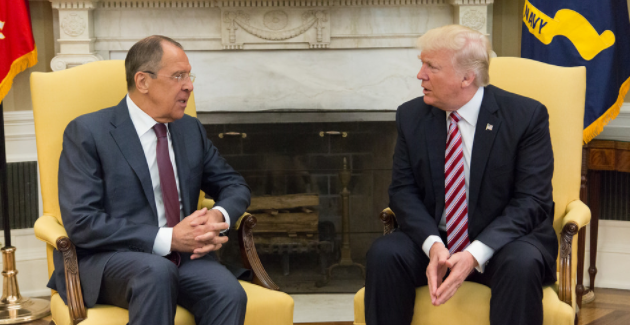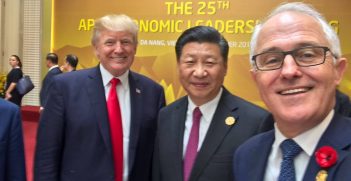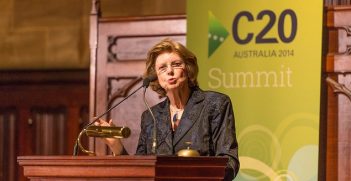Trump's Russian Tale Will be an Epic

Trump’s firing of FBI director James Comey and the appointment of Bob Mueller as special prosecutor have done nothing to impede the flow of leaks on the administration’s Russian links, even as the president travels.
Donald Trump is embroiled in a major scandal with far-reaching consequences. The ongoing Trump-Russia story is sucking most of the oxygen in Washington DC, which, at the very least, spells trouble for the president’s domestic agenda and seriously damages his international credibility. No president can be effective if he is hamstrung by scandal.
Recently appointed Special Prosecutor Bob Mueller—a highly respected nonpartisan former FBI director—will run an independent inquiry into the Trump campaign’s connections with Russia that will undoubtedly damage the president or his associates. Congressional committees are running their own investigations, and recently fired FBI Director James Comey is set to testify publicly before the Senate Intelligence Committee within the next few weeks. The media feeding frenzy is unlikely to end any time soon.
The Trump White House has reportedly been reorganised, with a war room-like structure designed to prevent the Russia story from engulfing the West Wing and, with it, the president’s agenda. By taking this step, the White House has accepted that the Russia story will be around for months and probably years.
The Republican Party, which prides itself as strong on national security, is slowly becoming more critical of President Trump. Veteran Republican Senator John McCain said last week that the scandal was reaching “Watergate size and scale”.
The respective chairs of the Senate Foreign Relations and Armed Services Committees—Bob Corker and McCain—were incensed by Trump’s reported intelligence leak to Russian Foreign Minister Sergey Lavrov. Speaker of the House Paul Ryan called for a “full explanation of the facts from the administration”.
Amid a frenetic pace of leaks and damning evidence concerning the potential obstruction of justice by the president, some Democrats in Congress are starting to talk about impeachment. But impeachment is ultimately a political act, rather than a legal one, requiring a majority of votes in the House of Representatives and 67 of the 100 votes in the Senate. For Trump to be impeached, all Democrats and almost 20 of the 52 Republican senators would have to vote against their own president.
Impeachment remains unlikely so long as Donald Trump maintains the widespread approval of the Republican Party’s base. According to Gallup’s weekly tracker, Trump’s approval rating among Republicans has not dropped below 81 per cent during his presidency. Republican members of Congress, especially in the House of Representatives, have little incentive to tear down or even oppose a president who is popular with the voters they depend on for re-election 2018.
Nonetheless, ongoing scandal will make it hard for President Trump to achieve the legislative successes on which any presidency depends. Trump faces a self-inflicted high degree of difficulty as he seeks to pass contentious legislation through a polarised Congress.
The Trump administration’s budget blueprint, which was announced while the president was in the Middle East, was met with “open hesitation or outright hostility” by Republicans in Congress. The Republican Senate leadership is in a particularly trying position as it starts walking the political tightrope on the repeal and replacement of Obamacare. Tax reform and a major infrastructure bill have been pushed to the end of this calendar year, and there is a good chance that neither will happen before the 2018 midterm elections.
Republican Senate Leader Mitch McConnell said it all last week: “I think we could do with a little less drama from the White House on a lot of things so we can focus on our agenda.”
Meanwhile, Democrats are invoking obscure Senate procedures to slow Republican progress on Capitol Hill. That will make it even harder for the Republican Senate to confirm nominees for deputy secretary, undersecretary and assistant secretary positions across the departments of state and defense and other federal agencies. The Trump administration has filled just 34 of the 557 key government positions requiring Senate confirmation.
Internationally, US allies and partners will be deeply concerned. The current barrage of leaks and negative reporting in The New York Times and The Washington Post makes it increasingly difficult for political leaders in foreign countries to do business with Trump’s America.
Trump’s loose lips are cause for concern. All foreign leaders—not least those who are meeting Trump on his current trip to the Middle East and Europe—will not want an account of their meeting with the president to be leaked to the press.
Most damaging are the risks to intelligence collaboration. Whether or not Trump disclosed classified information to the Russian foreign minister, it bears noting that a president has the legal right to declassify almost anything. But the Israelis, whose intelligence was supposedly shared with Russia, will be furious.
All US allies and partners will be re-evaluating their intelligence-sharing practices. Why share highly sensitive information with the United States if the president might disclose the information to the Russians, or anybody else for that matter?
Australia cannot escape the consequences. Our intelligence community is deeply intertwined with the United States, including Australian and US intelligence personnel mutually embedded in each other’s agencies. And it is much easier for Australian political leaders to champion the US alliance when the US president is not mired in a constant stream of negative media coverage.
The Russia scandal will probably dominate the headlines for months; Democrats and the media have no incentive to shift their focus while White House and intelligence sources keep on leaking to the press. The domestic and international consequences are only just beginning.
Dougal Robinson is a research fellow at the United States Studies Centre at the University of Sydney.
This article is published under a Creative Commons Licence and may be republished with attribution.




